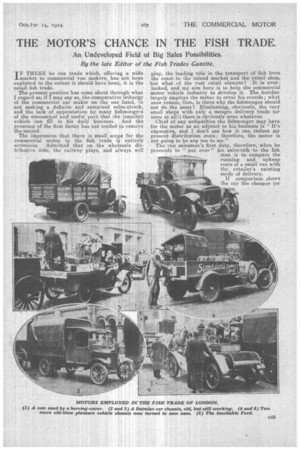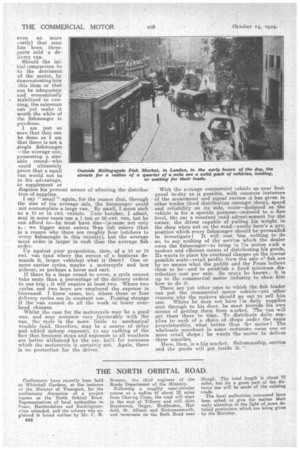THE MOTOR'S CHANCE IN THE FISH TRADE.
Page 27

Page 28

If you've noticed an error in this article please click here to report it so we can fix it.
An Undeveloped Field of Big Sales Possibilities. By the late Editor of the Fish Trades Gazette.
IF THERE be one trade which, offering a wide market to commercial van makers, has not been exploited to the extent it should have been, it is the retail fish trade.
The present .position has come about through what I regard as, if I, may say so, the comparative lethargy of the commercial ear maker on the one hand, In not making a definite and sustained sales-attack, and the lack of appreciation by many fishmongers of the economical and useful part that the (smaller) vehicle can fill in his daily business. And the presence of the first factor has not tended to remove the second.
The impression that there is small scope for the commercial motor, in the fish trade is entirely erroneous. Admitted that on the wholesale distributive side, the railway plays, and always will play, the leading role in the transport of fish from the coast to the inland market and the retail shop, but what of the vast retail. element? It is overlooked, and my aim here is to help the commercial motor vehicle industry to develop it. The butcher largely employs the motor to cover his rounds ; what sane reason, than, is there why the fishmonger should not do the same? Eliminating, obviously, the very small shops with only a. meagre delivery trade (or none at all!) there is obviously none whatever.
Chief of any antipathies the fishmonger may have for the motor as an adjunct to his business is "It's expensive,. and I don't see how it can reduce _my present distribution costs ; therefore, the motor is not going to be any use to me."
The van salesman's first duty, therefore, when he proceeds to " put over " his sales-talk to the fish man is to compare the running and upkeep costs r,),f a small van with the retailer's existing mode of delivery.
If comparison shows the car the cheaper (or even no more costly) that man has been threeparts sold a delivery van.
Should the initial comparison be to the detriment of the motor, by demonstrating how this item or that can be adequately and economically stabilized -in running, the salesman can yet make it worth the while of the fishmonger tc purchase.
I am just as sure that that can be done as I am that there is not a Jingle .fishmonger —the average one, possessing a sizeable round—who could ultimately prove that a small van would not be to his advantage, to supplement or displace his present means of effecting the distribution of supplies. I say " small " again, for the reason that, through the size of his average sale, the fishmonger could not contemplate a large van. By small, I mean such au a 10 or 15 cwt. veniele. Your butcher, I admit, may in some cases use a 1 ton or 30 cwt. van, but he can afford to—he must have size—'aecause not only a,. 3 we bigger meat eaters than fish eaters (that is a reason why there are roughly four butchers to every fishmonger in this country), but the average meat order is larger in cash than the average fish order.
Up against your proposition, then of a 10 or 15 cwt. van (and where the extent of ,r, business demands it, larger vehicles) what is there? One or more carrier cycles, maybe a motorcycle and box sidecar, or perhaps a horse and cart.
If there be a large round to cover, a cycle cannot take more than a percentage of the delivery orders in one trip ; it will require at least two. Where two cycles and two boys are employed the expense is increased. I know cases, too, where three or four delivery cycles are in constant use. Passing strange if the van cannot do all the work at lower overhead charges.
Whilst the case for the motorcycle may be a good one, and may compare very favourably with the van, tha cycle is the more liable to mechanical trouble (and, therefore, may be a source of delay and added upkeep expense), ta say nothing of the fact that frequent stops and exposure to all weathers are better withstood by the ear, buil.t for nurposea which the motorcycle is certainly not. Again, there is no protection for the driver. Outside Billingsgate Fish streets for a radius of a
With the average commercial vehicle as near foolproof to-day as is possible, with concrete instances of the economical and signal rerviee A has given in other trades (food distribution cariongri them), speed and reliability on its side, c.o.3ts—designed as the vehicle is for a specific purpose—reduced to a fine level, the car a constant road advert:r.ement for the owner, the driver capable of pulling his weight in the shop when not on the road—surely here's a proposition which every fishmonger should be persuaded to investigate? It will cost him nothing to do so, to say nothing of the service which the dealer owes the fishmonger—to bring o h-is notice sach a modern and efficient means of distributing his goods, He wants to place his overhead chargea on the lowest possible scale—retail profitG frona the Gale ca! fish are by no means what the public and the Press believe them to be—and to establish E. fixed minimum ,distribution cost per sale. So inne:i he knows ; it is up to the commercial motor industry to show him how to do it.
There are yet other uses to which the fish trader can put the commercial motor vehicle—yet other reasons why the makers should go out to sell him one. Where he does not have iis daily supplies sent through to his door, he must provide his own means of getting them from n.arket. The van will get them there to time. To distribute daily supplies to each of a chain of shops under the same proprietorship, what better than aha motor ? The wholesale merchant in some indances owns one or more retail shops; he wants the motor to deliver • these supplies. Here, then. is a big market. Salesmanship, service and the goods will get inside it. a:






























